In the News–Crisis Management
“There’s a ‘Fanatical Group of Worshippers’ in Your Stock. What’s Next?”
Lindsay Frost, Agenda, June 28, 2021

AMC Entertainment Holdings CEO Adam Aron has been actively embracing on Twitter, YouTube and other platforms a new trove of investors who propelled the company’s stock price up more than 300% in the past month. The latest Reddit-driven phenomenon has companies reconsidering how to communicate with these investors and encourage them to stick around — especially for those companies that could use the investment to pay off debt and invest in innovations.
The so-called meme stock frenzy, which has led to a deluge of retail investors pouring into AMC, GameStop, Clover Health and the GEO Group, is a hotly debated topic on Wall Street, but for boards overseeing companies that suddenly have an influx of retail investors, sources say it’s important to nail down the right messaging, consider incentivizing these investors and use the cash wisely.
“This brave new world of all of these Internet platforms and every person having their own voice has the power to whipsaw pretty much everything we thought we knew, and that extends to the fundamental value of stock,” says Davia Temin, president and CEO of risk consulting firm Temin & Co. “The wise board, and certainly the wise company, has to understand what is going on and figure out the way to communicate to all parties in a way that engenders trust.” […read more]
Red Corporation, Blue Corporation? Corporate political speech becomes a board issue
April Hall, Directors & Boards, 2021 Second Quarter

After the January 6 attack on the U.S. Capitol, many companies announced that they would halt political contributions, either permanently or for a defined period. Some discontinuations involved a particular political party, some individual legislators and some were complete stops on all contributions.
In the age of “cancel culture,” when social media can circulate calls for boycotts to millions of people in minutes, some companies have begun to act quickly, with either their words or their wallets, to distance themselves from political controversy But there are other companies that have leaned in to a variety of public political positions. This raises the question: Are some companies becoming recognized as “blue” (Democrat-supporting) or “red” (Republican-supporting), or even “purple”? And are such associations good for a company, its shareholders and its stakeholders?
***
Crisis communications consultant Davia Temin says she often encourages her client companies to take apolitical stands.
During political or social upheaval, sometimes “corporations have to become the adults in the room,” Temin says. Corporations need to maintain some neutrality, “but it’s the difference between making sure that as a corporation you have a purpose and if you’re true to purpose.”
However, she doesn’t usually advise being outwardly political. She says there is a difference between having a “political point of view” and speaking out about a “behavior,” like systemic racism.
“I still think strict political lines are not the way to go,” Temin says.
She also doesn’t support the legal idea behind the Supreme Court’s landmark 2010 decision in Citizens United v. FEC, which said the free speech clause of the First Amendment prohibits the government from restricting corporations’ independent expenditures for political communications. The decision has been popularly associated with the notion of “corporate personhood.”
“Corporations are not people,” Temin says. “They are conglomerations of people, and they need big tents for their clients, employees and other stakeholders.
“That is different than having a sole political point of view.” […read more]
Felicity Huffman lands 1st acting role since college admissions scandal
Good Morning America, December 1, 2020
The actress, who served 11 days in jail after pleading guilty in the Varsity Blues scandal, will star in an ABC comedy as the unlikely owner of a minor league baseball team.
“She’s been truly contrite and regretful, remorseful, about what she did,” said Davia Temin. “She comes out, maybe, with a renewed sense of purpose. That’s something that really works for reputation rehabilitation. Because it’s real.”
Franklin Fires Staffer the Day After Park Video Goes Viral
Annie Massa, Bloomberg, May 26, 2020
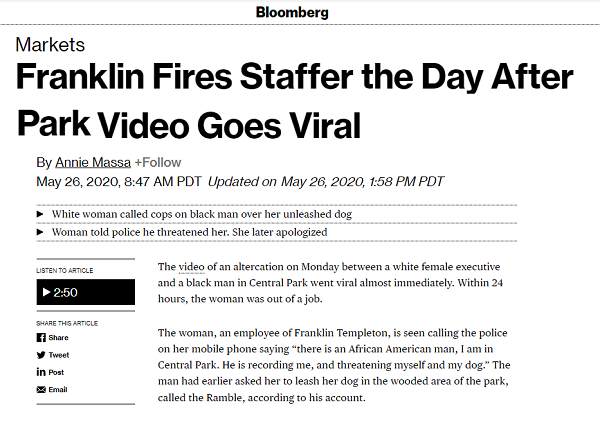
The video of an altercation on Monday between a white female executive and a black man in Central Park went viral almost immediately. Within 24 hours, the woman was out of a job.
The woman, an employee of Franklin Templeton, is seen calling the police on her mobile phone saying “there is an African American man, I am in Central Park. He is recording me, and threatening myself and my dog.” The man had earlier asked her to leash her dog in the wooded area of the park, called the Ramble, according to his account.
The incident underscores the nature of race relations in the U.S., in which African-Americans have faced outbursts — and worse — while simply going about their business. It also demonstrates that companies are increasingly holding employees accountable even for behavior that occurs outside the office.
“We’re living in chaos and predictable responses are going out the window,” said Davia Temin, founder of New York City crisis consultancy Temin and Co. “What wisdom would tell you, is to just walk away. But that usually takes a less stressful environment, and right now all the ions are charged.” […read more]
How companies are confronting the unparalleled uncertainty of the coronavirus crisis
Jena McGregor, The Washington Post, April 10, 2020
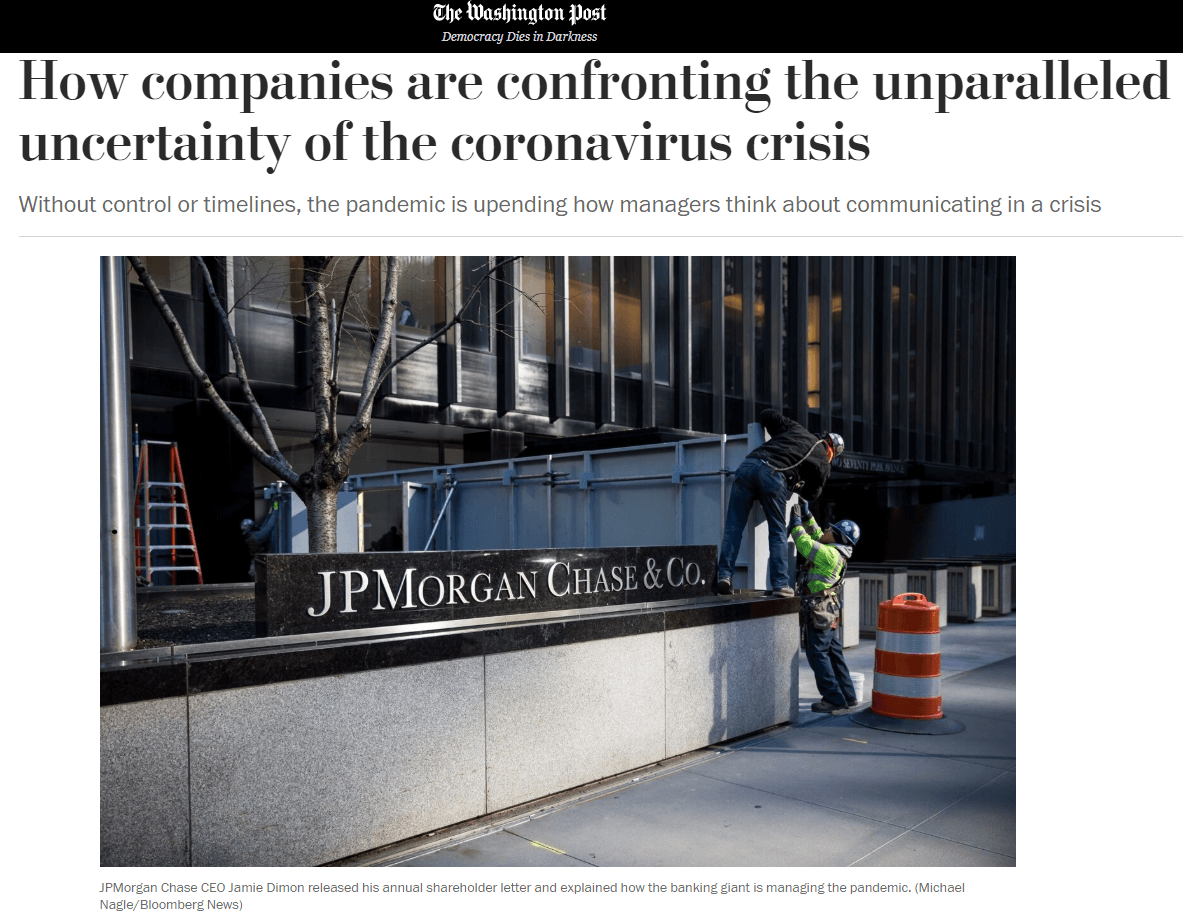
When JPMorgan Chase CEO Jamie Dimon released his widely read annual shareholder’s letter, he moved most of the typical charts and discussion about the company’s performance to the end, focusing instead “on issues that relate to our current crisis.”
His 23-page letter explained how the banking giant was dealing with the coronavirus pandemic, detailing different economic scenarios, explaining what it’s doing for employees and customers, and discussing the strength of its liquidity and balance sheet. But Dimon also wrote, “We do not know how this crisis will ultimately end, including how long it will last, how much economic damage it will do, or how fast or slow the recovery will be.” The “actual new crisis,” Dimon wrote, “while it shares attributes with what is being stress tested — is dramatically different from the expected.”
In virtual boardrooms across America, managers are confronting unprecedented uncertainty as they try to communicate — with their investors, their employees and their customers — amid the all-consuming scope and scale of the pandemic. Finely tuned scenario plans are being upended, project timelines are getting cast aside and conventional playbooks are proving insufficient as managers face a health and economic crisis with no modern parallel.
In some cases, “we are no longer in crisis management, we are in chaos management,” said Davia Temin, eponymous founder of a reputation and management consulting firm. “You can do certain things and mitigate a crisis. This is out of our hands to some degree now.” […read more]
‘Sometimes the Crisis Makes the Leader’: Andrew Cuomo and Five Lessons on Leadership
Kathryn Dill and Te-Ping Chen, The Wall Street Journal, April 8, 2020
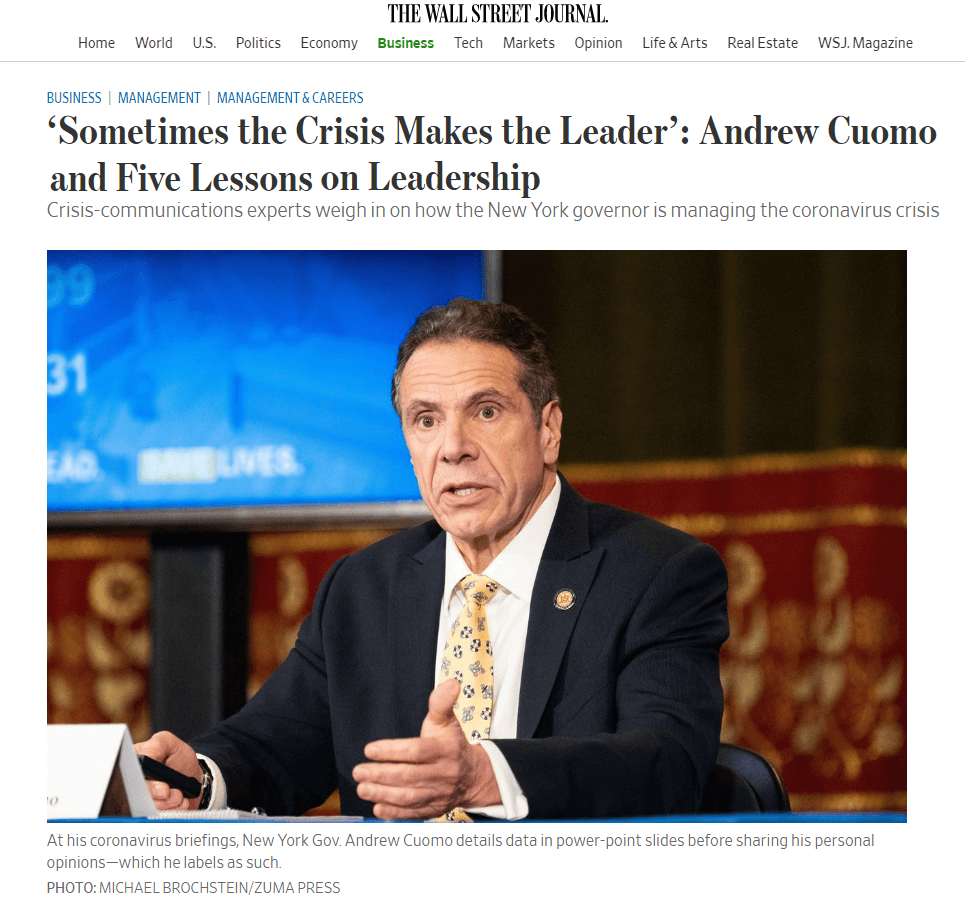
The nation is watching how New York Gov. Andrew Cuomo is handling the coronavirus outbreak, and it likes what it sees. Here’s how five crisis communications experts rate and react to his leadership style.
What America needs now is a field general, says Davia Temin, head of Temin & Co., a crisis-management and reputation consulting firm.
Someone who gives you facts, statistics, someone with a thoughtful, no-holds-barred, unvarnished approach. I’m not sure that Cuomo makes a perfect peacetime general, but he’s exactly what we need in a wartime general. He’s informed, his sleeves are rolled up, he’s walking the talk. He’s not abrogating the 6-foot rule just because he’s president or prime minister.
His brother’s situation has totally humanized him. It’s both intimate storytelling and authoritative, and that’s a very hard line to walk. I’m not sure I’d want to work for him—the pressure would be unholy—but he’s taking responsibility. He’s personally been trying to get ventilators, you get a feeling this is a guy in it up to his eyeballs.
In this kind of crisis, dysfunction kills. He has engaged our trust very quickly, and we need it more than we ever have, really. […read more]
A Death at Jefferies Highlights Urgency of C-Suite Backup Plans
Jeff Green, Bloomberg Quint, March 29, 2020

Like all aspects of society, the rules of the C-suite are being rewritten under the pressure of a deadly pandemic. Professionals who help companies ensure leadership continuity say the coronavirus crisis has added a new urgency to their work. Some say clients are mulling whether to further isolate key executives; other clients have made private jets a given for top leaders who still travel; some have scattered top lieutenants across the globe as an added precaution. At least one is poised to hire a new chief executive officer largely by video interviews.
“Just as the virus cascades deeper into a population, so now too does your succession plan have to cascade into the population, into the hierarchy,” said Davia Temin, founder of New York crisis consultancy Temin & Co. And while bosses like JPMorgan Chase & Co.’s Jamie Dimon — a cancer survivor who just had emergency heart surgery — have a good plan in place, today’s coronavirus crisis means “you have to think of the succession to the succession.” […read more]
Managing Your Bank’s COVID-19 Communications in Social Media
Steve Cocheo, The Financial Brand, March 19, 2020
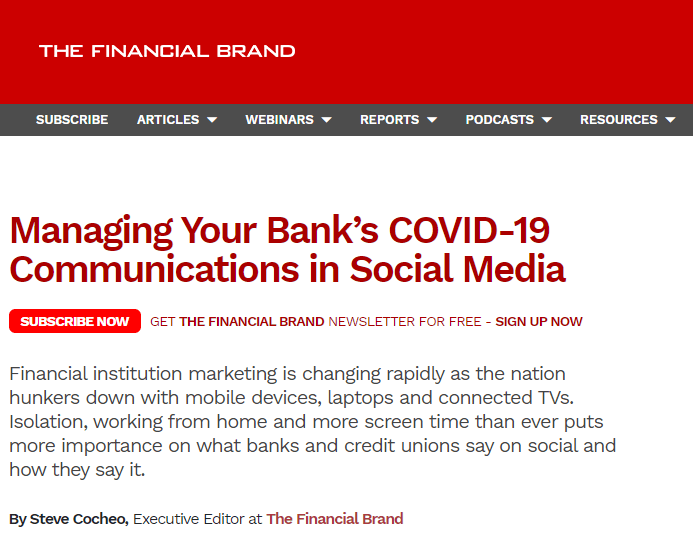
Financial institution marketing is changing rapidly as the nation hunkers down with mobile devices, laptops and connected TVs. Isolation, working from home and more screen time than ever puts more importance on what banks and credit unions say on social and how they say it.
Something that can be reassuring to both consumers and businesses is a demonstration that “we’ve got your back.”
“Banking institutions need to better communicate strength in uncertainty,” says Davia Temin, President and CEO of Temin and Company, a crisis management consultancy. “My suggestion is to channel Elizabeth Warren and ‘have a plan for that.’ Institutions might do well to showcase how much contingency planning they have done and how thorough it is. If the populace, the markets and the regulators believe them, life can be far less panic-driven.” […read more]
Is your board risk-ready?
Michele Wucker, Strategy + Business, March 11, 2020
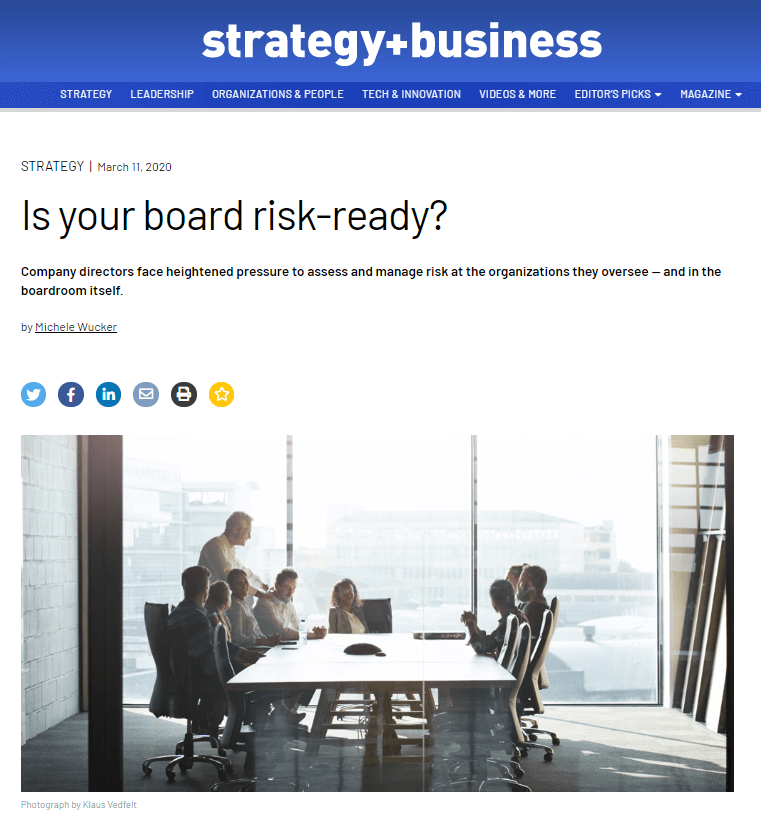
Your company’s board of directors is charged with reviewing all kinds of risks to the corporation. But how well prepared are its members to do so? How ready are directors to evaluate, communicate, and act on risks — and thus to better ensure that their companies are doing a good job? A great deal rides on the answers to these questions.
Understanding the risk attitudes of directors as individuals and as a whole can make all the difference if a risk materializes into a full-blown crisis. Davia Temin, founder of the New York–based crisis management firm Temin and Company, said it’s essential to understand and improve a board’s risk reaction dynamics during times of calm. “It’s better to fix the fissures on a board ahead of time because every fissure will explode in a crisis,” she said.
She recommends boards do an annual risk survey to determine how attuned different directors are to various risks. Crisis scenario games can shed light on differences among board members in their responses to stress and risks, and help board chairs to identify ahead of time which directors they might lean on most when — not if — a crisis hits. In fact, PwC’s 2019 survey found that the percentage of directors participating in crisis management tabletop exercises doubled since last year, from 28 percent to 56 percent. […read more]
Wells Fargo’s Duke Quits Before Turn in Washington Hot Seat
Hannah Levitt, Bloomberg, March 9, 2020 »
Wells Fargo & Co. Chair Betsy Duke resigned from the company’s board ahead of a dramatic congressional hearing set for this week, succumbing to the same political pressures that have claimed multiple former leaders of the bank.
The lender said Monday that board member Charles Noski will replace Duke as chair. Duke faced a growing chorus of calls for her departure after Democrats atop the House Financial Services Committee issued a scathing report last week on the bank’s response to a series of consumer scandals.
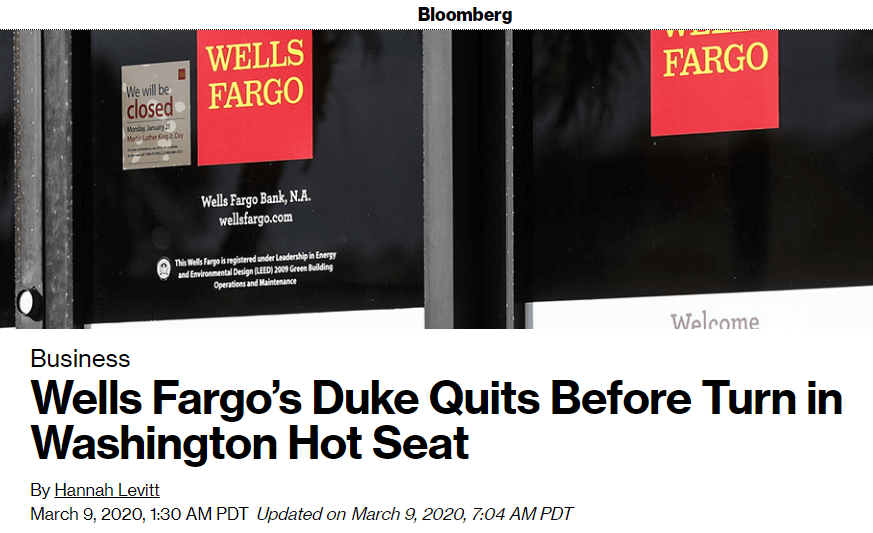 The latest set of hearings begins Tuesday with an appearance by CEO Charlie Scharf, less than five months into his tenure. The committee will seek his thoughts on next steps for what it calls “the bank that broke America’s trust.”
The latest set of hearings begins Tuesday with an appearance by CEO Charlie Scharf, less than five months into his tenure. The committee will seek his thoughts on next steps for what it calls “the bank that broke America’s trust.”
Scharf is preparing to answer questions on what he’s doing to get back in the good graces of customers, regulators and the public. He’s met with nearly half the House Financial Services Committee, including Waters, since taking over in October, people with knowledge of the meetings said.
He’ll be able to point to changes he’s made since taking the helm, including adding new leaders and settling past probes. And he can tout the bank’s recent announcements on minimum-wage increases, limited-fee bank accounts and lending to recipients of the Deferred Action for Childhood Arrivals program.
Scharf “can come on as a hard-nosed leader who is going to do the bidding of the public and fix things,” Davia Temin, founder of crisis consultancy Temin & Co., said in an interview. “America still loves a comeback kid.”
The board members faced a different task, Temin said. “It’s harder to be part of the problem and then the solution.” […read more]
More News Articles



